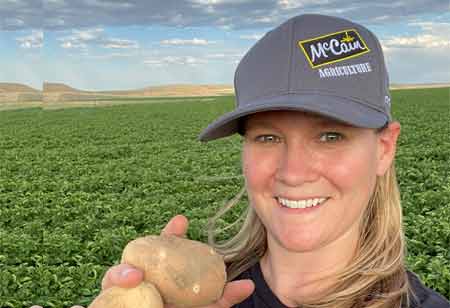

Thank you for Subscribing to Agri Business Review Weekly Brief

The widely shared goal for 2030 is to replace most of the standard potato varieties that have been grown for many years. The objective is to adopt new varieties of potatoes that will drastically reduce nitrogen inputs and improve water use, efficiency, and yield.
Seed Pipeline
To achieve this goal, McCain Foods is committed to developing a robust seed pipeline for new potato varieties to help growers meet sustainability goals while maintaining high yields and quality. “You must look five years out when planning a seed pipeline,” says Nicole Nichol, Director of Agriculture Seed and Variety for McCain Foods. “Seed multiplication of potatoes takes a very long time compared to other crops.” To address this, McCain brought on a seed team that included a seed agronomist and two seed representatives working with seed growers to contract volume. The seed team aims to provide guidance and financial backing to growers. They aim to de-risk and diversify across North America – expanding westward to be closer to the commercial grower.
Innovation Hubs
McCain Foods conducts various trials across North America to evaluate traits like disease resistance, nitrogen use efficiency, yield, and quality. High-potential varieties are advanced to pre-commercial trials on farm fields. The current pre-commercial trial at one of McCain’s Innovation Hubs is testing varieties selected for their potential to thrive in sustainable farming systems.
Growers who have questions about varieties in their regions or want to explore new potato varieties are encouraged to connect with a local McCain representative.
Nichol states, “A healthy new variety pipeline will provide flexibility for our end customers and help ensure supply reliability. By working with customers and seed growers, we can gain approval for new variety options across North America by 2030.” Exciting new varieties are demonstrating they’re suited to North American growing conditions. Some are an alternative to long-term storage varieties; others have early maturity to ensure moderation of the risk at harvest time. In response to increased disease pressure, it’s important to have varieties demonstrating resistance to nematodes and moderate resistance to verticillium. That, in turn, reduces the need for fumigation and improves EIQ scores, aligned with McCain’s Regenerative Agriculture Framework. The varieties that are now being selected are also more efficient, offering better yields and 20% less nitrogen than the traditional Burbank to achieve the same yield and quality. “By running these pre-commercial trials within the Innovation Hub, we are readying for the future where we will have to get more with less: gain more yield, keep consistent great quality, and navigate climate challenge,” says Nichol.
Partners
Growers who visited the Innovation Hubs are enthusiastic about this top variety of options. McCain is also encouraging conversations with researchers examining diseases. Most of all, the company is looking to continue sharing learnings and insights with customers. “The bottom line is supply assurance,” says Nichol. “There is a need for climate-resilient varieties to continue to deliver the volume and quality that customers expect, and we believe we have those varieties: they have plasticity, heat stress tolerance, and more. No one variety will solve all the North American challenges. Like a financial portfolio, we must diversify the risks with multiple varieties.” Customers are increasingly engaging in conversations about varieties and the importance of flexibility to assure supply for the long term.
Ambitions for 2030
McCain is working to increase seed availability for promising new varieties by coordinating with seed growers. With continued variety development, McCain's goal is to largely replace standard varieties by 2030 while gaining full customer approval for new options. This will drastically reduce nitrogen inputs and EIQ scores and move growers along the Regenerative Framework to achieve McCain’s 100% regen acres commitment by 2030. “Seed and varieties will help McCain and growers deliver on sustainability commitments and continue striving into the future,” says Nichols.
Growers who have questions about varieties in their regions or want to explore new potato varieties are encouraged to connect with a local McCain representative.
